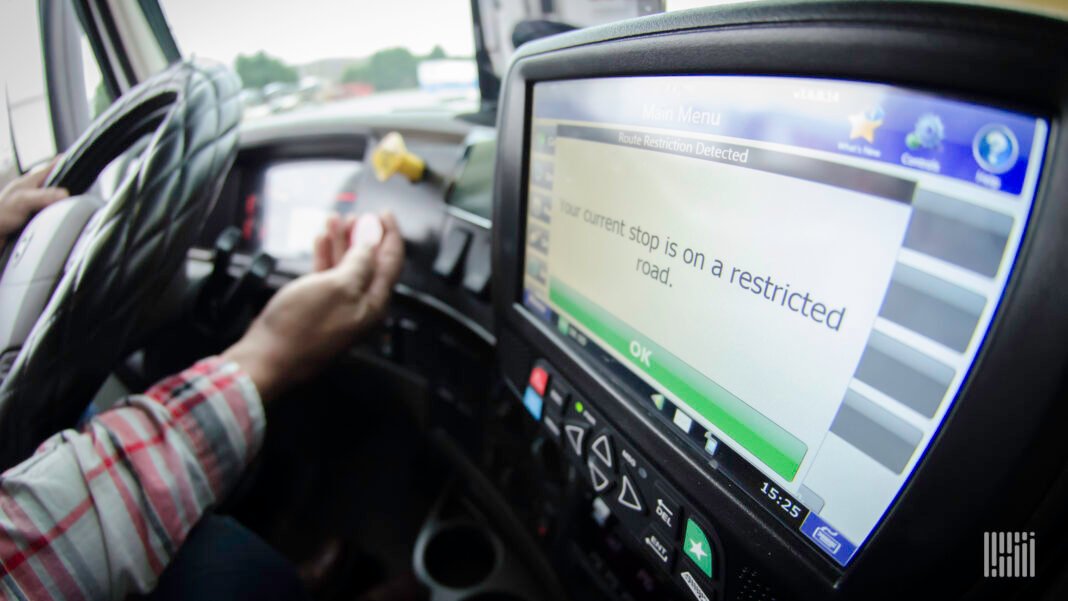WASHINGTON — Trucking has welcomed FMCSA’s effort to strip away regulatory red tape aimed at easing compliance burdens for motor carriers based on comments filed with the agency.
Among a slate of 18 deregulatory actions taken by FMCSA in May were several that had the potential to be particularly helpful for carriers – without compromising safety – including a proposed rule to rescind a requirement that a truck driver’s electronic logging device (ELD) operator’s manual be kept inside the truck.
“There is no readily apparent benefit to continuing to require that the users’ manual be in the [truck]” FMCSA stated in the proposal, and most of those commenting on it agreed.
“Removing the manual-carry requirement reduces clutter in the vehicle cab, simplifies compliance audits, and allows fuel marketers to focus training efforts on ensuring their drivers are proficient in using ELDs – not in maintaining duplicative documentation,” commented Rob Underwood, president of the Energy Marketers of America (EMA), whose members operate tank trucks that transport much of the country’s retail motor and heating fuel products.
“This proposal exemplifies a practical approach to regulatory reform that retains core safety objectives while reducing paperwork burdens for small businesses.”
Veolia North America, an environmental services company that hauls hazardous materials, believes that while it is a priority to ensure that drivers are trained in how to use their ELD system, “training programs should already emphasize driver proficiency with the ELD system and access to its support resources,” wrote Jennifer Fletcher, the company’s transportation compliance director, in comments to the agency.
“We believe this change will reduce regulatory burden without compromising safety and improve the efficiency of operations and inspections.”
Most commenters agreed. No one should receive an FMCSA violation “because they don’t have an instruction manual for a device that they should know how to use and that also has a digital manual on it,” said one.
Another thought the rule should be left in place. “There are so many systems out there and they are all different. What’s the big deal about keeping an operating manual on hand?”
FMCSA has also proposed revising a requirement that motor carriers and intermodal equipment providers sign and return completed roadside inspection forms to the state agency that issued it within 15 days, certifying that all necessary repairs have been made.
The problem with the federal regulation is that not all state agencies require that the forms be returned, and such a regulation requiring carriers to return them to states that don’t require or request them creates an unnecessary burden, according to FMCSA.
The solution: remove the requirement that roadside inspection forms be returned to the issuing agency unless the agency requires it.
The change was prompted by a petition filed by the Commercial Vehicle Safety Alliance (CVSA) in 2024.
“This provides regulatory relief for industry while still allowing jurisdictions the flexibility to require the forms be returned, should they see a safety benefit to doing so,” CVSA commented to FMCSA in recognizing its petition, which would “remove an unnecessary burden on industry without negatively impacting safety.”
EMA agreed, commenting that the regulation “has outlived its utility in an era of electronic records and digital inspection processes.
“For the energy marketing industry, this targeted deregulatory step would free up resources to support the safe and timely delivery of fuels.”
“Medical treatment” accident reporting
Modifying the definition of “medical treatment” for the purpose of accident reporting by motor carriers, based on guidelines already in place, will clarify for the trucking industry what constitutes an accident, FMCSA has asserted in another proposed rule.
The agency proposes adding to the regulations a paragraph stating that medical treatment does not include x-rays or other imaging, such as CT scans, and a person who does not receive treatment for diagnosed injuries or other medical intervention directly related to the accident has not received “medical treatment.”
The American Trucking Associations commented that while the change is welcome, the rulemaking should go further.
“Obtaining medical information regarding a third-party involved in a CMV [commercial motor vehicle] crash can be incredibly difficult, and at times, unfeasible,” wrote ATA Chief Operating Officer Dan Horvath.
“Motor carriers who have done their due diligence yet failed to obtain this information for reasons beyond their control should not be found in violation for omissions of medical information. We encourage the agency to consider this as it finalizes its rulemaking.”
Related articles:
Click for more FreightWaves articles by John Gallagher.


